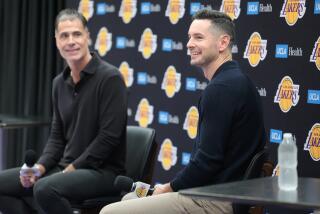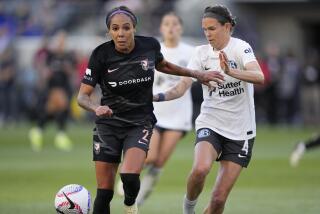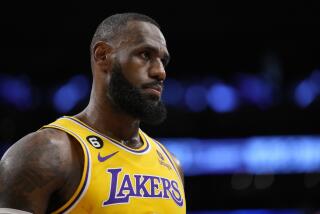NBA Tries to Hold It Together
- Share via
As Michael Jordan bade farewell to basketball, a dozen Clippers practiced at the Sports Arena.
As Jordan’s words were replayed across radios and television sets nationwide, Washington Wizard General Manager Wes Unseld closed himself away in meetings.
Even as the Chicago Bulls’ juggernaut teetered, ready to crash without its leader, teams throughout the NBA returned to work in the hopeful business of trying to build the next dynasty.
And the chances of another team coming along to win something like the six championships Chicago won in the last eight seasons are considerably better thanks to the recent labor deal.
While players and executives have yet to fully acquaint themselves with the agreement, most believe it includes key provisions for constructing a winner. Most important among those provisions, it gives teams a shot at hanging onto their top draft choices and superstars.
“You look at the teams that [were dynasties] before, nobody came or left,” said Dave Babcock, the Milwaukee Bucks’ director of scouting.
“The Celtics, I mean, those guys were there,” Babcock said. “Same with the Lakers. And with the Bulls, there were a few interchangeable parts, but the top guys were there the whole time.”
Like others around the league, Babcock had become dismayed at the frequency with which star players switched teams over the last decade.
The labor deal could slow that movement by establishing maximum salaries for all players. Teams bidding for free agents will be offering virtually the same salary the player already earns. No one can steal a superstar with a stratospheric offer.
That means organizations must work harder to establish a rapport with players.
“I’ve always felt that a player has the right to play where he wants to play,” Laker Vice President Jerry West said. “He’s just going to be limited by the scope of the salary, and I think for all of us on every team, we’re going to have to do a better job with our players in making them feel welcome.”
The Lakers should benefit because they have a number of top players on their roster and, by way of the new “average” salary exception, would still be allowed to add middle-class free agents.
But even a team such as the Bucks, who failed to make the playoffs last season, figure to keep guard Ray Allen and won’t worry so much about losing future draft choices to free agency.
“The last five or six years, teams didn’t think the draft was that important,” Babcock said. “Free agents were the way to go. But that just turned around big-time. Now you’re going to be able to hold onto that [draft pick].”
That is how teams have built dynasties in the past.
The Boston Celtics began assembling their greatest team in 1950, when Coach Red Auerbach drew Bob Cousy’s name from a hat and paid $8,500 to purchase his contract from the defunct Chicago Stags. Bill Sharman came aboard in 1951. Then, in 1956, Boston drafted Bill Russell, Tom Heinsohn and K.C. Jones.
“We needed a big defender,” Auerbach said. “I felt pretty sure Russell was that kind of player.”
Over the subsequent 10 years, those five players--plus a few more--remained pretty much intact and brought Boston nine championships.
Curiously, Sharman was present for the birth of the 1980s Laker dynasty. He was coach in 1975 when the team traded for Kareem Abdul-Jabbar.
Los Angeles subsequently drafted Norm Nixon and Michael Cooper. In 1979, Magic Johnson came aboard as the No. 1 pick and the team began a run that would include five titles in nine years.
In 1984, Chicago was laying the groundwork for its dynasty. The Bulls drafted Jordan in 1984, then traded for the draft rights to Scottie Pippen in 1987. By 1991, they had assembled a championship team.
Free agency and Jordan’s brief sojourn into baseball forced Chicago to retool in mid-stride, adding Dennis Rodman and Ron Harper to replace departed players.
The labor deal should make rosters more stable, league executives said. And that, they surmise, can only improve the odds of a team building another dynasty.
Still, as Jordan announced his retirement, Clipper guard James Robinson cautioned that salary limits will never replace one-of-a-kind talent.
“There’s not going to be another dynasty because we’re not going to have anyone like Michael,” Robinson said. “There are a lot of good players in the NBA who can step up, but there’s only one Michael.”
*
Times staff writers Tim Kawakami and Lonnie White contributed to this story.
More to Read
Go beyond the scoreboard
Get the latest on L.A.'s teams in the daily Sports Report newsletter.
You may occasionally receive promotional content from the Los Angeles Times.











